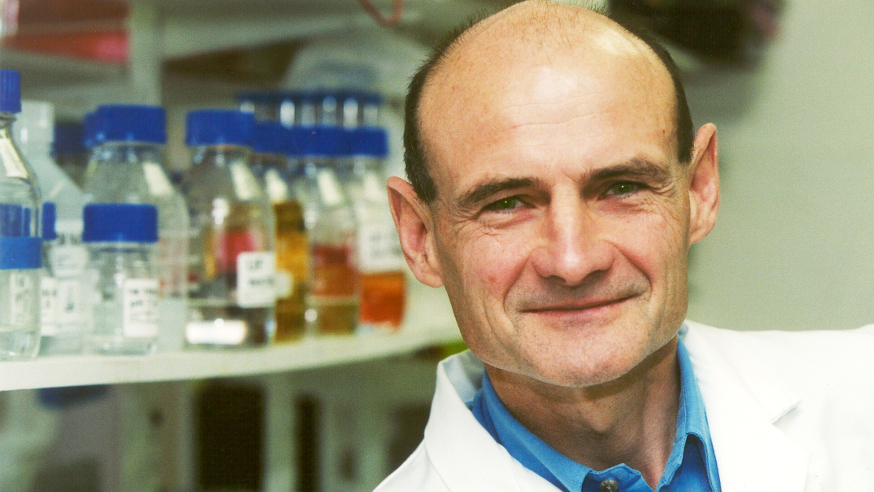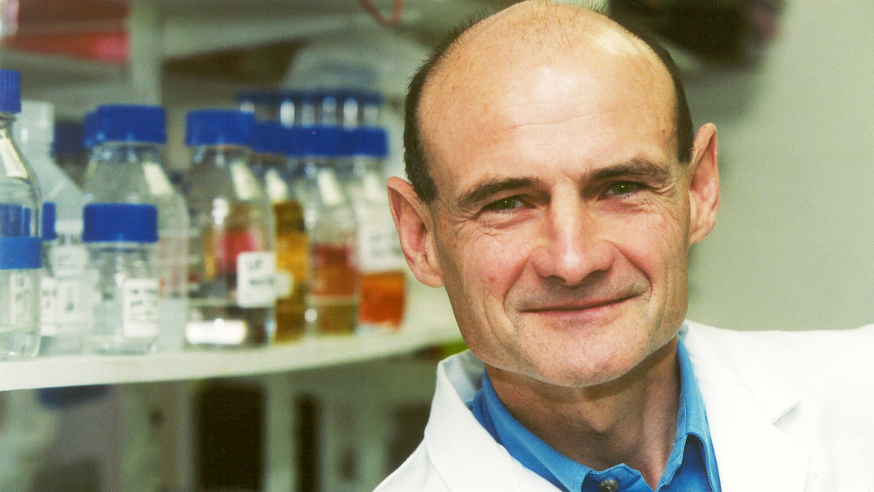Professor Chris Marshall, 1949–2015
Professor Chris Marshall, who has very sadly died aged 66, was an inspirational scientist who will leave a lasting legacy of game-changing discoveries in cancer research and generous support for his younger colleagues.

He was known for the rigour of his thinking, his exceptional scientific standards and a willingness to help others, including many scientists who are now themselves leaders in their fields.
Chris established an international reputation for his research into tumour cell signalling, with his major achievements including the discovery of the NRAS oncogene and the finding that oncogenic Ras proteins drive cancer cell proliferation through over-activation of the MAP kinase signalling pathway.
His research paved the way for four new classes of cancer drug to enter the clinic, two of which have been approved for widespread use in patient treatment today. He continued to drive important advances in our understanding of cancer cell signalling until shortly before his death, from colorectal cancer, on Saturday 8 August, 2015.
Chris began his life as a scientist by studying Natural Sciences at the University of Cambridge followed by a DPhil in cell biology at Oxford. He then worked as a postdoc at the Imperial Cancer Research Fund (now Cancer Research UK) Lincoln’s Inn Fields laboratories in London and the Dana-Farber Cancer Institute in Boston.
In 1980, he was recruited by Robin Weiss as a Team Leader at The Institute of Cancer Research in London – where he would work for the next 35 years – to begin studies to identify human oncogenes. Very quickly he joined forces with his late ICR colleague Alan Hall to search for new oncogenes using a technique to identify segments of tumour DNA that, when transfected into healthy cells, had the capacity to transform the cells. The two were highly skilled scientists with complementary interests, and made an exceptional team. Chris was fascinated by how cells communicated and behaved, whereas Alan brought an enzymology background and skills in the latest recombinant DNA technologies.
But for all their ability, the joint project at first proved challenging – and for more than a year they were unable to identify any specific oncogenes. They agreed that if they weren't successful with the next 20 samples, they would give up and try something else. Fortunately their efforts finally paid off, and they found evidence of an oncogene in DNA from two different samples, and showed that it was probably the same gene from two different tumours.
This novel oncogene turned out to be the third member of the Ras family, which Chris and Alan called NRAS. The finding was published in the June 1983 issue of the journal Nature and has proved a landmark in our understanding of the genetic drivers for cancer’s development. Around 12% of all human cancers contain an oncogenic version of NRAS or the related genes HRAS and KRAS, making these genes among the most mutated in cancer.
But Chris Marshall wasn’t satisfied simply with the discovery of a major oncogene – he also wanted to understand exactly how oncogenes go on to cause cancer. His work went on to show step by step – with his trademark and painstaking scientific rigour – how Ras proteins transmit signals from the outside of the cell to the nucleus, and how this signalling pathway becomes deregulated in cancer.
First his team published a major paper in Cell showing that to signal effectively, Ras proteins must undergo a process called farnesylation to become associated with the cell membrane. The finding opened up farnesylation as a potential target for new cancer drugs.
Next, he showed that these membrane-bound Ras proteins signal via the MAP kinase pathways and that when mutated MAP kinase signalling is over-activated. Chris then went on to help fill in the remaining gaps, working with others to show that Ras works through a complex signalling system to turn on MAP kinase signalling. First Ras activates members of the Raf family, which then activate a protein called MEK, which in turn switches on the MAP kinase signal.
Teasing out the roles of Raf and MEK in malignant transformation has been critical in advancing cancer therapeutics, with both the targets of recently approved cancer drugs that are benefiting patients worldwide. It has also helped transform our understanding of how cancer cells communicate – taking us from a model where proteins talk to each other in regimented lines to one of intricate signalling webs, with multiple layers of feedback loops and crosstalk.
Chris had a passionate belief in the need to translate the findings of basic cancer research such as his own into patient benefit, and played a key role in developing the ICR’s strategy. He was an inspirational Director of Research at the ICR under three Chief Executives, and also served with distinction as Team Leader, Professor of Cell Biology and Head of Cancer Biology.
Both in the ICR and in the wider scientific community, Chris was known as a generous and highly valued colleague with a wry sense of humour who went out of his way to help others – whether it be a senior lab head or a new PhD student. This willingness to mentor, support and nurture talent has resulted in a cadre of successful scientists working in cancer research today, including Professor Karen Vousden, Director of the Cancer Research UK Beatson Institute in Glasgow, Dr Erik Sahai, a Group Leader at the Francis Crick Institute, and Professor Richard Marais, Head of the Cancer Research UK Manchester Institute, among many others.
Chris Marshall received a succession of major honours and awards throughout his career. He was elected as a Fellow of the Royal Society and the European Academy of Cancer Sciences, he was a founding member of the Academy of Medical Sciences, and he was a member of the European Molecular Biology Organisation.
He was awarded the 1999 Novartis Medal of the Biochemical Society, the 2008 Buchanan Medal of the Royal Society and in 2015 the Biochemical Society Centenary Award. Chris had a long association with Cancer Research UK, gaining a Cancer Research UK Gibb Fellowship, winning the 2011 Cancer Research UK Lifetime Achievement in Cancer Research Award and working as Chair of the charity’s Science Funding Committee.
At the time of his death, Chris was studying the cell signalling mechanisms that promote the spread of cancer cells throughout the body – the major cause of cancer deaths. As his laboratory carries on this work, Chris's scientific achievements will continue to leave an enduring and powerful legacy for the whole of the cancer research community and, most importantly, for cancer patients.
He will be sincerely missed by all his many friends and colleagues.
Chris Marshall is survived by his wife Lesley, and by his three children from his first marriage and four grandchildren.
